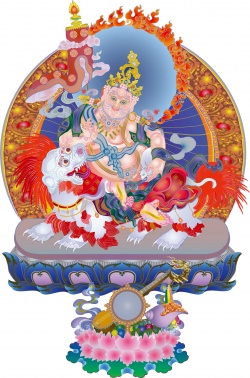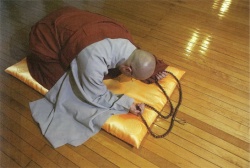Difference between revisions of "Many in body, one in mind"
(Created page with " <poem> many in body, one in mind 異体同心; (Jpn itai-doshin ) A {{Wiki|concept}} used to describe {{Wiki|ideal}} {{Wiki|unity}}. Nichiren (1222-1...") |
|||
| Line 1: | Line 1: | ||
| − | + | <nomobile>{{DisplayImages|169|1866}}</nomobile> | |
| Line 8: | Line 8: | ||
[[異体同心]]; (Jpn [[itai-doshin]] ) | [[異体同心]]; (Jpn [[itai-doshin]] ) | ||
| − | A {{Wiki|concept}} used to describe {{Wiki|ideal}} {{Wiki|unity}}. [[Nichiren]] (1222-1282) used the [[phrase]] to encourage {{Wiki|unity}} among his followers. | + | A {{Wiki|concept}} used to describe {{Wiki|ideal}} {{Wiki|unity}}. |
| + | |||
| + | [[Nichiren]] (1222-1282) used the [[phrase]] to encourage {{Wiki|unity}} among his followers. | ||
| − | In his [[writing]] known as Many in | + | In his [[writing]] known as [[Many in Body, One in Mind]], [[Nichiren]] states, "If the [[spirit]] of many in [[body]] but one in [[mind]] prevails among the [[people]], they will achieve all their goals, whereas if one in [[body]] but different in [[mind]], they can achieve nothing remarkable" (618). |
| − | Another [[writing]] of [[Nichiren]], The Heritage of the { | + | Another [[writing]] of [[Nichiren]], The [[Heritage of the {Ultimate Law of Life]], says: "All [[disciples]] and lay supporters of [[Nichiren]] should [[chant]] [[Nam-myoho-renge-kyo]] with the [[spirit of many in body but one in mind]], transcending all differences among themselves to become as [[inseparable]] as {{Wiki|fish}} and the [[water]] in which they swim. |
This [[spiritual]] bond is the basis for the [[universal]] [[transmission]] of the [[Wikipedia:Absolute (philosophy)|ultimate]] Law of [[life]] and [[death]]. | This [[spiritual]] bond is the basis for the [[universal]] [[transmission]] of the [[Wikipedia:Absolute (philosophy)|ultimate]] Law of [[life]] and [[death]]. | ||
| − | Herein lies the true goal of [[Nichiren's]] [[propagation]]" (217). This expression can also be translated as "different in [[body]], same in [[spirit]]." "Different in [[body]]" can be interpreted as suggesting the [[uniqueness]] of {{Wiki|individuals}}, and "same in [[spirit]]," a goal or commitment shared among {{Wiki|individuals}}. | + | Herein lies the true goal of [[Nichiren's]] [[propagation]]" (217). |
| + | |||
| + | This expression can also be translated as "different in [[body]], same in [[spirit]]." | ||
| + | |||
| + | "Different in [[body]]" can be interpreted as suggesting the [[uniqueness]] of {{Wiki|individuals}}, and "same in [[spirit]]," a goal or commitment shared among {{Wiki|individuals}}. | ||
</poem> | </poem> | ||
{{R}} | {{R}} | ||
http://www.sgilibrary.org/search_dict.php | http://www.sgilibrary.org/search_dict.php | ||
[[Category:]] | [[Category:]] | ||
Revision as of 14:59, 26 November 2015
many in body, one in mind
異体同心; (Jpn itai-doshin )
A concept used to describe ideal unity.
Nichiren (1222-1282) used the phrase to encourage unity among his followers.
In his writing known as Many in Body, One in Mind, Nichiren states, "If the spirit of many in body but one in mind prevails among the people, they will achieve all their goals, whereas if one in body but different in mind, they can achieve nothing remarkable" (618).
Another writing of Nichiren, The [[Heritage of the {Ultimate Law of Life]], says: "All disciples and lay supporters of Nichiren should chant Nam-myoho-renge-kyo with the spirit of many in body but one in mind, transcending all differences among themselves to become as inseparable as fish and the water in which they swim.
This spiritual bond is the basis for the universal transmission of the ultimate Law of life and death.
Herein lies the true goal of Nichiren's propagation" (217).
This expression can also be translated as "different in body, same in spirit."
"Different in body" can be interpreted as suggesting the uniqueness of individuals, and "same in spirit," a goal or commitment shared among individuals.
Source
http://www.sgilibrary.org/search_dict.php [[Category:]]

